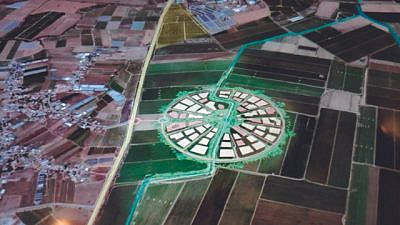
The village in the Western Negev, near the city of Netivot, will be structured as a “community settlement” (yishuv kehilati), meaning its residents will be organized in a cooperative and have the power to approve or veto a sale of a house or a business to any buyer.
The name “Hanun,” chosen due to the site’s proximity to the seasonal stream Nahal Hanun, is only temporary. The community’s official name will be decided upon soon in a regional council meeting, Ram Hachmon, the spokesman of the Sdot Negev Regional Council, told JNS. “There are already a lot of ideas for an official name,” he said.
Hachmon continued, “It was decided that the community should be mixed between religious and nonreligious so that everyone could take part in this new project.” He expects it to ready for use in something like 18 to 24 months.
The establishment of the new town has been in the works for a long time, with the first actions taken back in 2014, he said. Its construction was supported by the Ministry of Construction and Housing, and received further approval from the National Planning and Building Council in January 2022, he added.
The Sdot Negev Regional Council will be responsible for overseeing the construction.
The Ministry of Construction and Housing said in a statement on Sunday that the site was chosen with care, as it is situated between existing agricultural settlements and near vital civil infrastructure, to minimize the impact on the environment.

Response to terror
The Cabinet’s approval of the new community has been linked to the recent wave of Palestinian terrorist attacks. The final approval came after a request by Otzma Yehudit Party MK Almog Cohen in response to rocket fire from the Gaza Strip.
The “Gaza envelope,” the area near the Gaza Strip, has been under continuous threat from Hamas, the terrorist group that seized control of the Strip in 2007. The communities in the area have been targeted by thousands of rockets from Gaza over the past two decades.
The establishment of Hanun was celebrated as a symbol of resilience and strength against these threats.
Tamir Idan, head of the Sdot Negev Regional Council, said: “This moment is the victory of light over darkness, the victory of Zionism over terrorist organizations.
“A new settlement in Israel is a true civil response to the terrorist attacks. The message must be clear and unequivocal: Let our enemies know that for every threat and act of terrorism and every missile fired at the State of Israel, there will be a crushing response by the security forces and more homes, buildings and settlements will be erected in the Land of Israel,” Idan said.
Prime Minister Benjamin Netanyahu similarly noted that “the establishment of the town is further evidence of the resilience of the Israelis living in the Gaza border area and the strength of the State of Israel against all threats. In the face of attack, we react with strength.”
Many political leaders also expressed the belief that the new community embodies the Zionist ideal of settling the Land of Israel.
Prime Minister Netanyahu stated that the new settlement is “an expression of fundamental Zionism and the settlement of Israel.”
Yitzhak Goldknopf, the minister of construction and housing, said on Sunday that he will make it his goal to continue building, developing and strengthening communities in Israel. He called the establishment of Hanun a “happy day” and of “enormous national importance.”
The realization of Zionism
Yigal Brand, the director general of the World Betar Movement, congratulated the government on the establishment of Hanun and said he saw it as a way to strengthen Israel’s hold on the land near Gaza and the “most effective step in the realization of Zionism at this time.”
He quoted Zionist hero Joseph Trumpeldor, saying, “Wherever the plow plows its last furrow, that is where the border will run.”
However, the approval of Hanun faced objections from the Finance Ministry.
In a document published on January 19, 2022, the ministry estimated that the community would cost the state NIS 40 million (about $11.5 million) for public institutions and approximately NIS 83 million (close to $24 million) for infrastructure, with no designated budgetary source.
The Budget Department in the ministry emphasized that, according to Basic Law: The State Economy, a budgetary source should have been specified before the Cabinet decided on the establishment of the village.
Former Deputy Minister in the Prime Minister’s Office Abir Kara said that “construction must focus on the center of the country. We should not invest resources in areas where it will be difficult for us to generate employment.”
The Finance Ministry further stated that expanding Netivot would be a better option than building a new community. The establishment of Hanun will come at the expense of the expansion of Netivot, the ministry added.
The cost of developing Hanun will also be NIS 50 million (about $14.3 million) more than a similar development in Netivot, the ministry said.
The city, located less than two kilometers from the Hanun site, ranks low on the Bank of Israel’s socioeconomic index. According to the Finance Ministry, this likely means that wealthier families from Netivot and the surrounding area will be attracted to Hanun. “The new settlement may become another heavy millstone around the neck of Netivot,” a ministry representative warned.
In response to the approval of the new community, the city of Netivot voiced its objection, calling it “direct and unfair competition.”